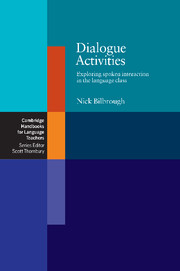Book contents
- Frontmatter
- Contents
- Thanks and acknowledgements
- Introduction
- 1 Understanding
- 2 Analysing
- 3 Reproducing and reconstructing
- 4 Memorising
- 5 Rehearsing and performing
- 6 Co-constructing
- 7 Creating and personalising
- 8 Communicating
- 9 Dialogue as learning
- Dialogue Bank A From the film Mulholland Drive
- Dialogue Bank B Authentic snippets
- Dialogue Bank C Snippets from fairy tales
- Dialogue Bank D Lame jokes
- Dialogue Bank E Situational dialogues
- Dialogue Bank F ‘Dating Agency’ from the comedy series Little Britain
- Further reading and resources
- Index
- Frontmatter
- Contents
- Thanks and acknowledgements
- Introduction
- 1 Understanding
- 2 Analysing
- 3 Reproducing and reconstructing
- 4 Memorising
- 5 Rehearsing and performing
- 6 Co-constructing
- 7 Creating and personalising
- 8 Communicating
- 9 Dialogue as learning
- Dialogue Bank A From the film Mulholland Drive
- Dialogue Bank B Authentic snippets
- Dialogue Bank C Snippets from fairy tales
- Dialogue Bank D Lame jokes
- Dialogue Bank E Situational dialogues
- Dialogue Bank F ‘Dating Agency’ from the comedy series Little Britain
- Further reading and resources
- Index
Summary
The importance of memory in learning a second language cannot be underestimated. Just think of how many words a student needs, for both recognition and production, in order to achieve even an intermediate level of English: current estimates put this figure at around 3,000. All of these words, at some time, have to be stored in the student's long term memory, and have to be available for immediate retrieval. But it's not just words that the student needs to commit to memory. Researchers are now convinced that fluency in speech and writing owes in large part to the learner's capacity to store, not just individual words, but lexical ‘chunks’. Chunks are groups of words that tend to occur together, either because they are common collocations, like fair hair, fair enough, fair and square, or because they are fixed formulaic utterances, like greetings (nice to meet you) and other speech acts (would you like a cup of tea?). These chunks are encountered, stored and retrieved as individual units. Some researchers estimate that proficient speakers have a memorised ‘bank’ of literally tens of thousands of these items.
Dialogues are an ideal way of providing learners with a rich diet of words and chunks in context, and in a format that allows easy and repeated practice. It follows, then, that there are good grounds for sometimes asking students to memorise them.
There are many factors which will influence how readily language items will be retained by students. Repetition is perhaps the most fundamental.
- Type
- Chapter
- Information
- Dialogue ActivitiesExploring Spoken Interaction in the Language Class, pp. 91 - 106Publisher: Cambridge University PressPrint publication year: 2007

